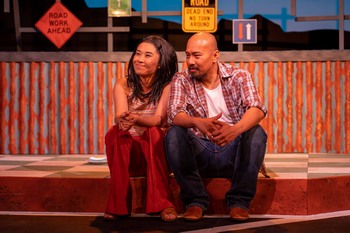Under David Winitsky’s direction, a stellar five-person cast radiates political and artistic passion and mostly transcends stereotypes.
/cloudfront-us-east-1.images.arcpublishing.com/pmn/QNPXCDWZOFGYJL6PO5E5LJV2YI.jpg)
Seth Rozin’s Settlements deliberately offers what the controversial play powering its plot does not: the balanced expression of multiple viewpoints.
Inspired by real-life events, Rozin’s world-premiere drama at his InterAct Theatre Company fuses smart intellectual debate with economical storytelling. Its weaknesses are its dearth of action and an occasionally distracting detour through the thickets of gender identification. Under David Winitsky’s direction, a stellar five-person cast radiates political and artistic passion and mostly transcends stereotypes.
Rozin, InterAct’s cofounder and producing artistic director, favors punning titles. His 2018 play, Human Rites, which drew on anthropological research into the practice of female circumcision, explored cultural differences and human rights. Settlements references the occupation of the Palestinian West Bank by Israel. But its larger subject is the desirability of overcoming polarization and forging compromise.
The characters in Settlements, especially a half-Jordanian, half-Jewish playwright and a wealthy donor with strong ties to Israel, aren’t exactly at home in that territory.
/cloudfront-us-east-1.images.arcpublishing.com/pmn/KGX7ZAOAVBGTNNLNLRHDZO747U.jpg)
Rozin’s play owes its premise to a 2013 imbroglio involving the D.C. Jewish Community Center and its well-regarded Theater J. The center fired Ari Roth, the theater’s longtime artistic director, after years of contention over programming sympathetic to Palestinians and critical of Israel.
The center has commissioned a work by a young playwright, Yasmine (Becca Khalil), betting that the writer’s mixed heritage will produce a balanced examination of Middle Eastern issues. It turns out to be a bad bet.
Yasmine identifies as nonbinary and uses the pronoun “they,” which Noah readily adopts and other characters reject or stumble over. The stumbles take up too much stage time. But Yasmine’s identity also bears thematic weight, symbolizing the need to reject binary ideologies and find common ground. Yasmine, ironically, won’t be the one to do it. Impelled by a West Bank encounter to chronicle the impact of violence on a Palestinian family, she has lost interest in portraying Israeli characters or perspectives.
Noah tries, gently, to coax Yasmine into more complexity, while fending off interference from the center and its board. In Rishard’s prickly, charismatic portrayal, he is not anyone’s notion of an ideal employee, but his advocacy of artistic independence seems admirable. His most dedicated antagonist is Cesar, a retired ophthalmologist, philanthropist, and son of a Holocaust survivor whose largesse is jeopardized by Yasmine’s intransigence. Mitch Greenberg is excellent in the role, which Rozin renders with unexpected sympathy.
Trying to find the elusive middle ground are Judith and the center’s board president, Marion (Emily Zacharias), elegantly attired by costume designer Natalia de la Torre.
Along with a few pieces of furniture, Marie Laster’s scenic design includes off-white and blue sliding panels, suggesting both boundary walls and Israel’s national colors, and a silhouetted cityscape evoking the West Bank. The set strikes a nice balance — that word again — between realism and the symbolic world of the imagination.
Settlements
Presented by InterAct Theatre Company at the Proscenium Theatre at The Drake, 302 S. Hicks St., through April 24. Vaccination proof and masks required. Tickets: $35. Information: 215-568-8079 or www.interacttheatre.org.Published April 11, 2022
Review by Julia M. Klein for the Philadelphia Inquirer



/cloudfront-us-east-1.images.arcpublishing.com/pmn/U4XM6PBUE5DH7BKNAOZDQGRIPM.jpg)
/cloudfront-us-east-1.images.arcpublishing.com/pmn/ZNBQ7WMTUJAZ7IG6AG5YI3CANQ.jpg)



